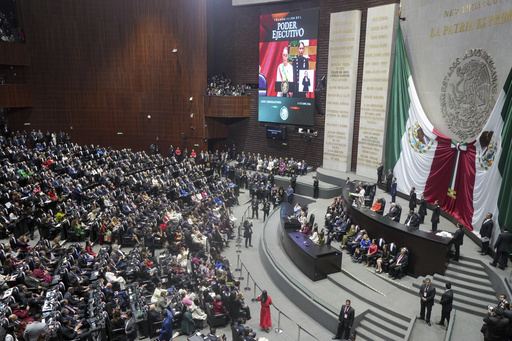
MEXICO CITY — Legislative bodies in Mexico, primarily controlled by the ruling Morena party, have enacted significant amendments to the Constitution that effectively prevent the judiciary from challenging any Constitutional reforms.
Historically, Mexican courts had the authority to assess whether new reforms infringed upon existing Constitutional elements or international treaties ratified by Mexico.
Beginning Friday, the newly implemented changes will offer complete immunity to any amendment secured by two-thirds majorities in both Congress and in state legislatures, prohibiting judicial scrutiny.
Supporters of the Morena party argue that courts should not have the ability to override the decisions made by elected officials; however, detractors contend that these new regulations undermine essential checks and balances while removing individuals’ rights to contest violations in court.
The impetus for this reform stems from frustration within the Morena party, which was founded by former President Andrés Manuel López Obrador, regarding judicial interventions that halted several of his significant initiatives.
One notable instance occurred when López Obrador’s efforts to bolster state-owned utilities’ market dominance were blocked by the courts, which ruled those actions contradicted Constitutional demands for free competition.
Though López Obrador concluded his presidency on September 30, his successor, President Claudia Sheinbaum, who assumed office the following day, has pledged to uphold his policy agenda.
Previously, the judicial landscape was characterized by an ambiguous understanding of judges’ authority to determine if certain Constitutional elements conflicted with others.
Nevertheless, it was widely recognized that fundamental rights, such as human rights or international agreements, took precedence over other constitutional principles.
Now, it remains uncertain if there are any channels for appeal beyond international courts.
Critics are particularly alarmed by the rapid-fire succession of Constitutional changes facilitated by the Morena party, which currently possesses overwhelming majorities in both legislative chambers.
These changes, which include the militarization of federal law enforcement, have often been approved in mere hours with minimal debate, providing little opportunity for legislators to adequately review the amendments.
Skeptics assert that the judiciary, despite its historical struggles with corruption and inefficiency, is the sole branch not under Morena’s control, leading the ruling party to aim for its diminishment.
This situation permits any political party that commands both the presidency and the legislature to enact virtually any changes they desire, potentially paving the way for extreme scenarios, such as proclaiming Mexico a monarchy, warns Georgina de la Fuente from the Latin American Observatory on Political Reforms.
In addition to these reforms, the Morena party has already implemented changes mandating that all judges, up to the Supreme Court, be elected.
Opponents express concern that this could result in politically motivated selections for judicial roles, opening the door for powerful drug cartels to back candidates for judicial positions, given that funding will be required for election campaigns.
Critics have also noted that the new criteria for judicial candidates are insufficient, requiring only letters of recommendation from acquaintances, a 4.0 GPA from law school, and vague “legal experience.”
This contrasts sharply with the previous system, which involved rigorous civil service progress for years before judicial appointments.
As for the potential to block these reforms, Mexico’s Supreme Court may be able to review them, but it is uncertain whether they will have the legal basis to do so.
Furthermore, most justices have indicated plans to resign in August in response to the new election mandates for judges.
The reforms are retroactive, essentially nullifying legal challenges from court employees who believe their rights are being compromised as a result of the shift to elected judges.
Many of these employees have invested decades in climbing the civil service ranks, aspiring to eventually become judges.
These developments set Mexico apart from other nations, entering a realm of unpredictability.
In various countries, citizens can appeal against laws or Constitutional amendments they believe infringe upon their rights or interests.
While it is rare for court challenges to overturn Constitutional amendments, such actions can influence their interpretation.
Countries like the United States, which hold elections for local judges, have never entirely replaced their federal judges with numerous elections in such a short timeframe.
